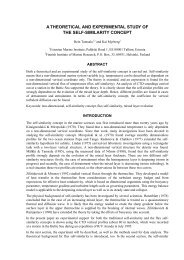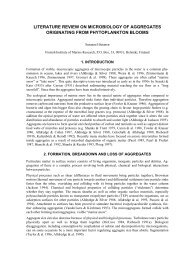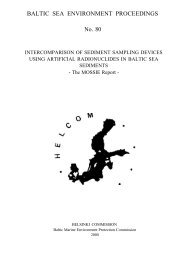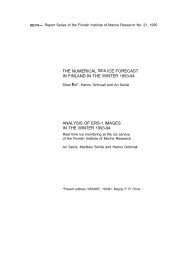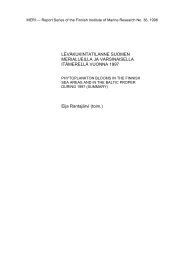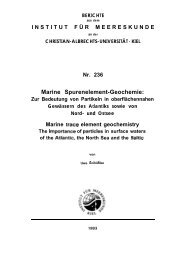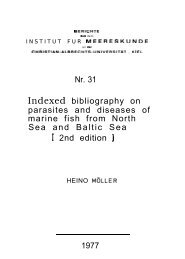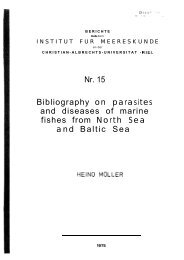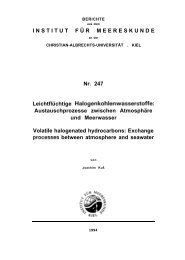marine research in finland - Baltic Marine Environment Bibliography
marine research in finland - Baltic Marine Environment Bibliography
marine research in finland - Baltic Marine Environment Bibliography
You also want an ePaper? Increase the reach of your titles
YUMPU automatically turns print PDFs into web optimized ePapers that Google loves.
<strong>in</strong>stitutions such as FIMR. The division of <strong>research</strong> <strong>in</strong>to basic and applied science is not relevant<br />
<strong>in</strong> oceanography. We have our responsibilities to the regional community, and the only way to<br />
provide good applications is to have a sound scientific basis.<br />
The <strong>Baltic</strong> Sea, is and will be, the ma<strong>in</strong> focus even <strong>in</strong> the future. In particular its w<strong>in</strong>tertime<br />
processes (ice, thermodynamics) and circulation, as well as long term variability. The <strong>Baltic</strong> Sea<br />
is also <strong>in</strong> many respects a good model a good model base for experimentation with acceptabJe<br />
scales for full atmospheric forc<strong>in</strong>g, earth rotation and <strong>in</strong>terest<strong>in</strong>g stratification. We ought to<br />
<strong>in</strong>vite more process studies <strong>in</strong>to these areas from outside the local <strong>research</strong> community. On the<br />
other hand, <strong>in</strong> order to keep both contacts with the external world and to ma<strong>in</strong>ta<strong>in</strong> our<br />
competence, a certa<strong>in</strong> amount of activities must be focused towards the open ocean. If we limit<br />
ourselves to the <strong>Baltic</strong>, our understand<strong>in</strong>g of the ma<strong>in</strong> trends <strong>in</strong> physical oceanography will<br />
certa<strong>in</strong>ly deteriorate. We have to be active <strong>in</strong> climate-related studies <strong>in</strong> order to f<strong>in</strong>d our proper<br />
role as oceanographers, and <strong>in</strong> order to be able to relate the results of the <strong>Baltic</strong> studies <strong>in</strong>to a<br />
proper frame. This aga<strong>in</strong>, can be obta<strong>in</strong>ed by apply<strong>in</strong>g our knowledge to other sea areas, such as<br />
the polar seas.<br />
The well known statement of Lord Kelv<strong>in</strong>: “If you cannot quantify it, you do not understand it”,<br />
is equally valid today as it was one hundred years ago. In practical terms this implies that mere<br />
description is out, process analysis, modell<strong>in</strong>g and prediction are <strong>in</strong>. This puts stress on the quality,<br />
but <strong>in</strong> modem scientific atmosphere it is the way for survival. For a small <strong>research</strong> community,<br />
quality is the way to provide optimal output. This applies also to the choice of themes, not<br />
only to performance. It is often easy to ma<strong>in</strong>ta<strong>in</strong> familiar themes, which may have lost some of<br />
their relevance a long time ago. Our goal should be to th<strong>in</strong>k big, even if it implies risks <strong>in</strong> produc<strong>in</strong>g<br />
the results we would like to obta<strong>in</strong>. Small themes may sell <strong>in</strong> some journals, but too small<br />
themes will certa<strong>in</strong>ly not lead to truly significant progress.<br />
2. CHEMICAL MARINE RESEARCH<br />
Matti Perttila<br />
There are three issues concern<strong>in</strong>g <strong>mar<strong>in</strong>e</strong> <strong>research</strong> <strong>in</strong> general that I want to emphasize here. The<br />
first is publicity. At this sem<strong>in</strong>ar, there aren’t any representatives of the media, nor did we actually<br />
expect there to be, but nevertheless it is a sign of the reservedness of the <strong>mar<strong>in</strong>e</strong> <strong>research</strong><br />
community. In my op<strong>in</strong>ion, the requirement to publish should be regarded as a two-dimensional<br />
obligation: on the one hand, we must publish on the <strong>in</strong>ternational scientific forum, but on the<br />
other hand we must also be able to justify our own existence to the layman. It’s these people that<br />
pay our salaries as taxes. For this reason it’s essential to be able to popularize scientific results<br />
and conclusions, although it is not easy: it’s often easier to get one’s articles accepted by <strong>in</strong>temational<br />
scientific journals than by national newspapers.<br />
The second issue is the purposefulness of our work. We must possess a strategic goal from<br />
which, through our own “excellency” and opportunities and threats created by external possibilities,<br />
we tease out the realizable projects. For example, <strong>in</strong> chemical <strong>mar<strong>in</strong>e</strong> <strong>research</strong> our strategic<br />
goal is the future assessment of our <strong>mar<strong>in</strong>e</strong> environment <strong>in</strong> different environmental scenarios.<br />
The need for this goal arises from the fact that it is not sufficient to tell society (and decisionmak<strong>in</strong>g<br />
politicians) what the situation <strong>in</strong> the <strong>mar<strong>in</strong>e</strong> environment is, and how it was a hundred<br />
years ago. What the layman wants to know is the environmental development <strong>in</strong> the <strong>Baltic</strong> dur<strong>in</strong>g<br />
the next few generations. In addition, the estimated economic <strong>in</strong>vestments required for environmental<br />
purification are of such magnitude that the taxpayers certa<strong>in</strong>ly want to know, with at<br />
least some accuracy, what the consequences of these actions are. This k<strong>in</strong>d of goal requires <strong>in</strong>terdiscipl<strong>in</strong>ary<br />
th<strong>in</strong>k<strong>in</strong>g about the methods of ecosystem modell<strong>in</strong>g. In this concept, what would<br />
represent chemical oceanography? Certa<strong>in</strong>ly an estimation of chemical concentrations is needed<br />
to be able to apply physical current and dispersation measurements and models to reach the<br />
goal, but the mere mapp<strong>in</strong>g of concentrations is not a very ambitious project. Instead, <strong>research</strong><br />
<strong>in</strong>to the processes connected with substance balances is very challeng<strong>in</strong>g, and is essentially connected<br />
with ecosystem studies. Chemical <strong>research</strong> <strong>in</strong> the F<strong>in</strong>nish Institute of Mar<strong>in</strong>e Research is<br />
39



